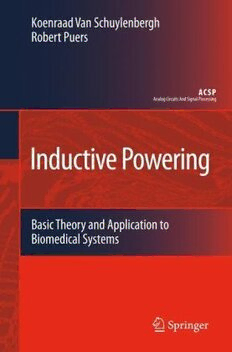Download Inductive Powering: Basic Theory and Application to Biomedical Systems (Analog Circuits and Signal Processing) PDF Free - Full Version
Download Inductive Powering: Basic Theory and Application to Biomedical Systems (Analog Circuits and Signal Processing) by Koenraad Van Schuylenbergh, Robert Puers in PDF format completely FREE. No registration required, no payment needed. Get instant access to this valuable resource on PDFdrive.to!
About Inductive Powering: Basic Theory and Application to Biomedical Systems (Analog Circuits and Signal Processing)
Inductive powering has been a reliable and simple method for many years to wirelessly power devices over relatively short distances, from a few centimetres to a few feet. Examples are found in biomedical applications, such as cochlear implants; in RFID, such as smart cards for building access control; and in consumer devices, such as electrical toothbrushes. Device sizes shrunk considerably the past decades, demanding accurate design tools to obtain reliable link operation in demanding environments. With smaller coil sizes, the link efficiency drops dramatically to a point where the commonly used calculation methods become invalid. Inductive Powering: Basic Theory and Application to Biomedical Systems lists all design equations and topology alternatives to successfully build an inductive power and data link for your specific application. It also contains practical guidelines to expand the external driver with a servomechanism that automatically tunes itself to varying coupling and load conditions.
Detailed Information
| Author: | Koenraad Van Schuylenbergh, Robert Puers |
|---|---|
| Publication Year: | 2009 |
| ISBN: | 9789048124114 |
| Pages: | 233 |
| Language: | English |
| File Size: | 9.938 |
| Format: | |
| Price: | FREE |
Safe & Secure Download - No registration required
Why Choose PDFdrive for Your Free Inductive Powering: Basic Theory and Application to Biomedical Systems (Analog Circuits and Signal Processing) Download?
- 100% Free: No hidden fees or subscriptions required for one book every day.
- No Registration: Immediate access is available without creating accounts for one book every day.
- Safe and Secure: Clean downloads without malware or viruses
- Multiple Formats: PDF, MOBI, Mpub,... optimized for all devices
- Educational Resource: Supporting knowledge sharing and learning
Frequently Asked Questions
Is it really free to download Inductive Powering: Basic Theory and Application to Biomedical Systems (Analog Circuits and Signal Processing) PDF?
Yes, on https://PDFdrive.to you can download Inductive Powering: Basic Theory and Application to Biomedical Systems (Analog Circuits and Signal Processing) by Koenraad Van Schuylenbergh, Robert Puers completely free. We don't require any payment, subscription, or registration to access this PDF file. For 3 books every day.
How can I read Inductive Powering: Basic Theory and Application to Biomedical Systems (Analog Circuits and Signal Processing) on my mobile device?
After downloading Inductive Powering: Basic Theory and Application to Biomedical Systems (Analog Circuits and Signal Processing) PDF, you can open it with any PDF reader app on your phone or tablet. We recommend using Adobe Acrobat Reader, Apple Books, or Google Play Books for the best reading experience.
Is this the full version of Inductive Powering: Basic Theory and Application to Biomedical Systems (Analog Circuits and Signal Processing)?
Yes, this is the complete PDF version of Inductive Powering: Basic Theory and Application to Biomedical Systems (Analog Circuits and Signal Processing) by Koenraad Van Schuylenbergh, Robert Puers. You will be able to read the entire content as in the printed version without missing any pages.
Is it legal to download Inductive Powering: Basic Theory and Application to Biomedical Systems (Analog Circuits and Signal Processing) PDF for free?
https://PDFdrive.to provides links to free educational resources available online. We do not store any files on our servers. Please be aware of copyright laws in your country before downloading.
The materials shared are intended for research, educational, and personal use in accordance with fair use principles.

